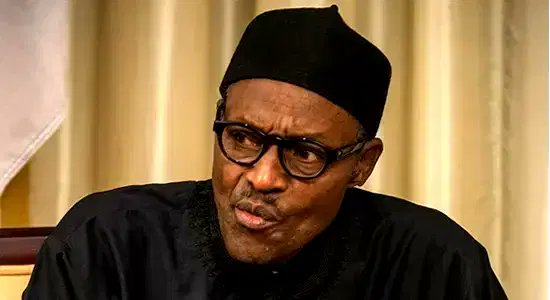
Buhari Reflects on Legacy, Urges Leaders to Prioritize Citizens' Welfare Over Personal Gain

In a rare moment of introspection, former Nigerian President Muhammadu Buhari made a striking revelation that caught the attention of the nation and the international community alike. Reflecting on his time in office, Buhari shared a poignant and powerful message that spoke directly to the hearts of leaders and citizens alike. With a deep sense of humility and an unwavering sense of duty to the people, Buhari disclosed, “I left office with the same physical assets I had before my presidency.”
This statement was more than just a personal reflection; it was a call to action aimed at every current and future leader to uphold the sanctity of their office and ensure that the welfare of the citizens remains the highest priority above all else. In his closing days as president, Buhari emphasized that true leadership is not about accumulating wealth or status, but about dedicating oneself to the betterment of the people they serve.
During his eight years as the president of Africa’s most populous nation, Buhari’s leadership was often a topic of intense debate. Supporters lauded his anti-corruption stance, while critics pointed to challenges in the economy and security. However, with his recent statement, Buhari seems to have found common ground with a significant portion of the population that agrees with his overarching message about the need for integrity in leadership.
Buhari's words come at a time when political and economic systems globally are under intense scrutiny. In many parts of the world, and especially in developing nations, leaders often find themselves in positions where their personal fortunes expand dramatically during their time in power. This trend, whether through wealth accumulation, illicit practices, or influence-peddling, has caused widespread disillusionment and distrust among the masses. Buhari’s candid admission about his departure from office with the same assets he entered with stands as a stark contrast to the behavior exhibited by many world leaders, particularly those whose leadership tenures are marked by corruption or extravagant lifestyles funded by public coffers.
The former president’s statement highlights an important shift in the conversation about leadership in the modern era. It serves as a reminder of the ideals that ought to guide political leadership, particularly in a country like Nigeria, which has long struggled with political corruption and the misallocation of national resources. In his view, a leader’s personal wealth should never overshadow the needs of the people they were elected to serve. Buhari’s own example, whether or not one agrees with all his policies, can be interpreted as an appeal for more ethical governance.
For many Nigerians, Buhari’s words resonate deeply, especially in the face of the economic challenges they continue to face. Despite his administration’s efforts to tackle issues like corruption, insurgency, and unemployment, the country has seen significant struggles, including a floundering economy, a rising cost of living, and frequent insecurity challenges. The call for leaders to prioritize citizens' welfare over personal gain is not just a philosophical ideal; it is a practical solution that could transform the nation.
Buhari's statement underscores the need for an intentional shift away from a culture where public office is seen as a means to personal enrichment. By encouraging leaders to think beyond their own personal interests, Buhari’s message pushes for a focus on policies that are centered on tangible improvements to the lives of ordinary citizens, rather than on short-term political gains or wealth accumulation.
One of the major criticisms of Nigeria’s political landscape has been the apparent disconnect between the governing class and the general populace. While government officials often enjoy luxurious lifestyles, many Nigerians continue to struggle with basic issues like healthcare, education, and infrastructure. Buhari’s candid remarks about his presidency, and his assertion that he departed office with the same physical assets he had before entering, could serve as a blueprint for future leaders to emulate, especially in a society where politicians often face accusations of corruption. His message is clear: a leader’s success should be measured by the prosperity and welfare of their people, not by the riches they amass during their time in office.
Moreover, Buhari’s reflection on his own tenure sheds light on a deeper issue within the political system: the culture of entitlement and self-interest that has come to dominate leadership roles. The former president’s comment could be seen as a call to the current generation of leaders to abandon self-serving practices that undermine public trust and instead focus on policies that benefit the masses. His leadership was not without its flaws, but his commitment to not enriching himself through his position is a quality that sets him apart in the eyes of many.
While some might view Buhari’s statement as an attempt to reshape his legacy, it is nonetheless a necessary conversation that all leaders, especially in developing countries, must have. His remarks also invite a broader discussion on how to foster a new political culture, one that values public service over personal gain, and that is dedicated to the common good. For a country like Nigeria, whose political and economic systems have often been plagued by corruption, Buhari’s call is a timely reminder that leadership is about service, not self-enrichment.
It’s important to recognize that Buhari’s presidency was marked by efforts to fight corruption, curb political instability, and improve security. However, many Nigerians were left frustrated as the country’s economic woes persisted, and the promise of change felt unfulfilled for many. Despite this, his final remarks add a layer of complexity to his leadership—an invitation to reflect on the integrity of political office and the importance of ethical behavior in public service.
In his post-presidency reflections, Buhari’s call to future leaders could serve as a guiding principle for a new generation of Nigerian politicians. As the country looks to the future, it is essential that those who seek positions of leadership understand the profound responsibility they bear to their citizens. Their duty is not to enrich themselves, but to work tirelessly to improve the lives of the people they represent.
While it remains to be seen how Buhari’s words will influence the political landscape moving forward, his appeal for ethical leadership and a focus on public welfare could be the catalyst for much-needed change. In an age where the line between public service and personal gain has often been blurred, Buhari’s message stands as a clarion call for integrity, honesty, and a deep commitment to serving the people above all else.
As Nigeria continues its journey toward greater stability and prosperity, Buhari’s legacy—and his call for leaders to prioritize the welfare of citizens over personal enrichment—will undoubtedly remain a key point of reflection for those in power, both within the country and beyond.


